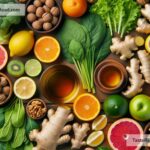Foods for Enhancing Respiratory Efficiency
Breathing is one of the most vital functions of the human body. Every breath helps deliver oxygen to your cells and remove carbon dioxide, making your respiratory system crucial for overall health. Keeping your lungs and airways healthy is essential, especially in times when air pollution, smoking, or allergies might challenge your respiratory efficiency. Did you know that the food you eat can play an important role in supporting your lung health? Let’s explore some easy, accessible foods that can improve respiratory efficiency and help your lungs work better.
Why Nutrition Matters for Your Lungs?
Your lungs are constantly exposed to outside elements like dust, smoke, viruses, and pollutants. These can cause inflammation or weaken your lung capacity over time. Fortunately, a healthy diet packed with antioxidants, vitamins, and minerals can protect your lungs, reduce inflammation, and boost their performance. Foods that fight free radicals, reduce oxidative stress, and keep your airways clear are key for healthy breathing.
Foods That Boost Lung Health
Here are some foods you can include in your diet to enhance respiratory efficiency:
1. Leafy Greens
Spinach, kale, and other leafy greens are loaded with antioxidants like vitamin C and beta-carotene, which help fight inflammation in the lungs. Spinach also contains magnesium, which relaxes the muscles surrounding the airways, making breathing easier. Add leafy greens to your salads, smoothies, or soups for a respiratory boost.
2. Berries
Blueberries, strawberries, and raspberries are tiny nutritional powerhouses packed with antioxidants. They contain anthocyanins, which are known to protect lung tissue from damage caused by oxidative stress. Eating a handful of berries or adding them to your breakfast can improve your lung capacity over time.
3. Citrus Fruits
Oranges, lemons, and grapefruits are rich in vitamin C, an essential nutrient for lung health. Vitamin C can help prevent respiratory infections and reduce lung inflammation. Drinking fresh orange juice or squeezing lemon into your water can provide your lungs with the protection they need.
4. Garlic and Onions
These flavorful ingredients are great for more than just cooking—they help fight inflammation and promote a healthy immune system. Garlic contains a compound called allicin, which is known for its anti-inflammatory and antimicrobial properties. Onion has similar benefits and can help reduce mucus buildup, making breathing easier.
5. Apples
Apples are full of antioxidants and fiber, which make them excellent lung-friendly fruits. Studies have shown that eating apples regularly may lower the risk of developing asthma or other chronic respiratory conditions. The quercetin in apples has anti-inflammatory effects, which help keep your lungs clear.
6. Nuts and Seeds
Walnuts, almonds, sunflower seeds, and chia seeds are great sources of omega-3 fatty acids, which can help reduce inflammation in your lungs and improve respiratory efficiency. Omega-3 fats also promote better immune function, protecting your lungs from harmful infections and irritants.
7. Fatty Fish
Fatty fish like salmon, mackerel, and sardines are another excellent source of omega-3 fatty acids. These fats are known to reduce inflammation and support lung function. Consuming fish a couple of times a week can be beneficial for your respiratory health.
8. Turmeric
This yellow spice is famous for its anti-inflammatory properties, thanks to the active compound called curcumin. Turmeric can help reduce inflammation in your airways and improve oxygen flow. Try adding turmeric to your meals or mixing it into a warm glass of milk.
9. Ginger
Ginger is another powerful food for your lungs. It helps break down mucus in the airways, making it easier to breathe. Ginger also contains anti-inflammatory properties that reduce irritation in the lungs. You can drink ginger tea or incorporate fresh ginger into your cooking for its benefits.
10. Beets and Beet Greens
Beets and their leafy tops are rich in nitrates, which improve oxygen uptake in your lungs and enhance overall respiratory efficiency. Adding beets to your salads, smoothies, or roasting them as a side dish can help boost your breathing performance.
11. Water
Drinking enough water is crucial for healthy lungs. Staying hydrated helps thin out mucus in your airways, making it easier to breathe. Aim for about 8-10 cups of water a day to keep your lungs functioning at their best.
Foods to Avoid for Lung Health
While the foods mentioned above can boost your respiratory efficiency, some foods may have a negative impact on your lungs. Try to limit or avoid the following:
- Processed foods with high levels of trans fats or added sugars, as they can increase inflammation in the body.
- Excess salt, which may contribute to water retention and swelling in the respiratory tract.
- Fried foods, which produce harmful compounds that irritate the airways.
Small Changes, Big Rewards
Improving your respiratory efficiency doesn’t have to be complicated. Small changes to your diet can lead to significant improvements in your lung health over time. Focus on incorporating fresh, whole foods that are rich in antioxidants, vitamins, and anti-inflammatory nutrients. Pairing these foods with regular exercise, deep breathing, and staying smoke-free will keep your lungs strong and ensure that you’re breathing easy.
Your lungs deserve care, and the right foods provide the fuel they need to function optimally every day. So next time you’re planning your meals, think about how you can include these lung-friendly foods—you’ll be breathing easier in no time!


